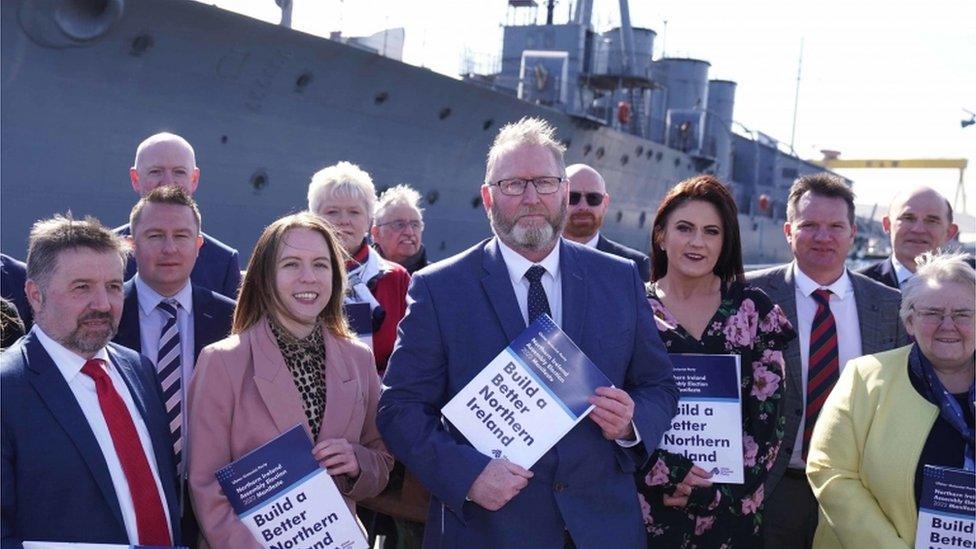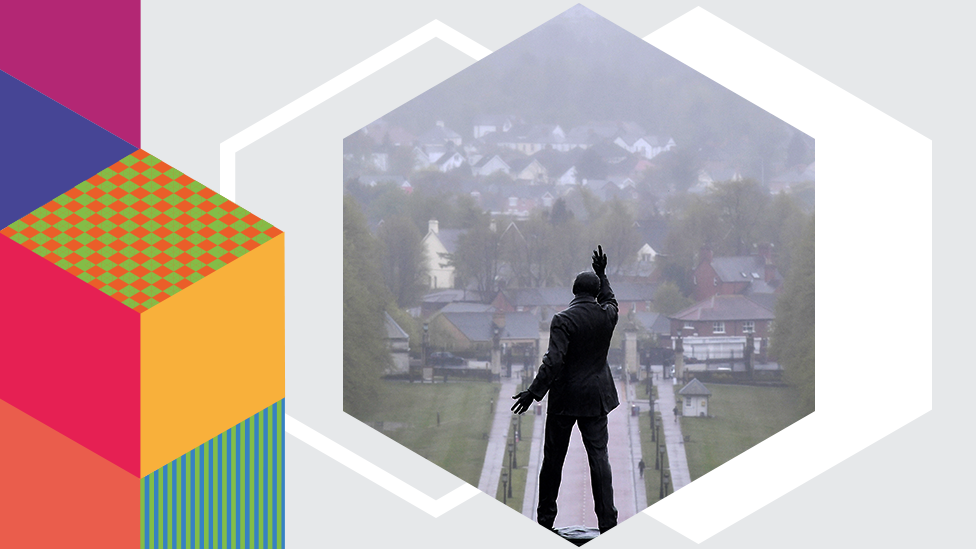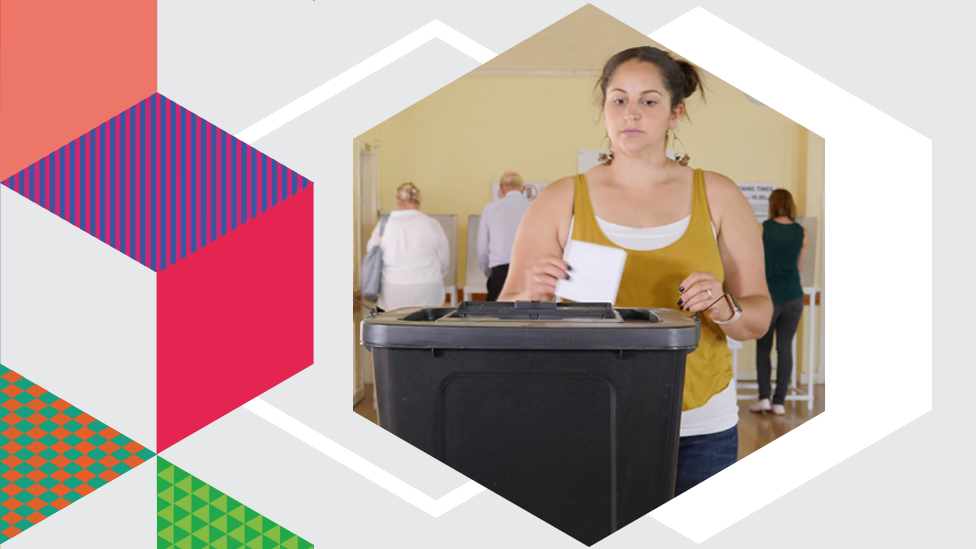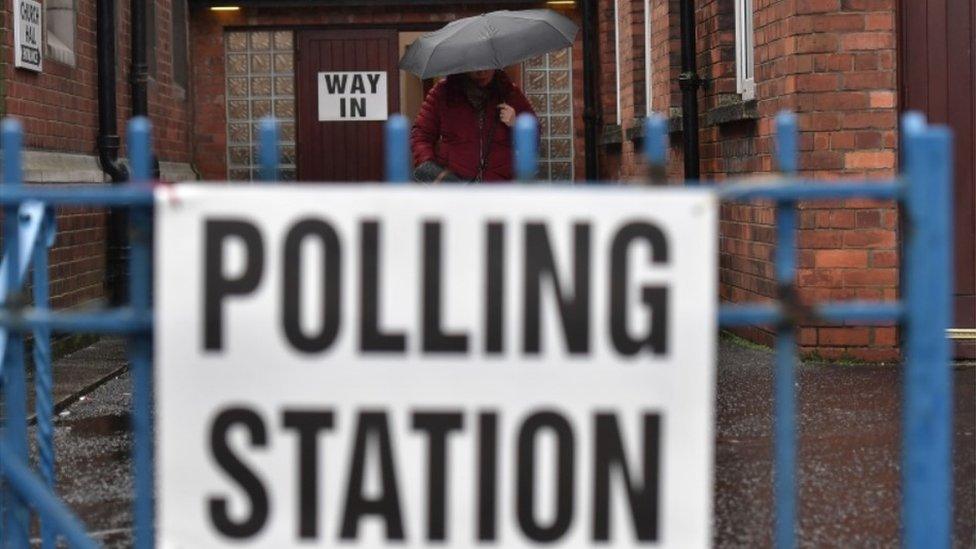NI election 2022: UUP hopes fresh image will provide a polling boost
- Published

Doug Beattie has led the UUP since spring 2021
Lauren Kerr has been a member of the Ulster Unionist Party (UUP) for exactly half her life.
She's still only 30. She's also female - obviously - and gay.
She was 12 during the assembly election of 2003.
That's the one best remembered for the "Fuss at the Bus" and for the Democratic Unionist Party finally overtaking the Ulster Unionists as the biggest party at Stormont.

SIGN UP FOR ALERTS: Get extra updates on BBC Northern Ireland election coverage

The narrow margin then has now become a chasm.
So when Lauren Kerr told her party's election manifesto launch that the next assembly poll "is the most important election the Ulster Unionist party has ever fought" it was quite a statement.
After all it has been fighting them for more than 100 years.

POSTCODE SEARCH: Full list of candidates standing in my area

But this is not the party of Edward Carson and James Craig. Or even of David Trimble and Reg Empey.
Two of its candidates are gay - one a former member of the Progressive Unionist Party. Another is Catholic.
Its election broadcast features, not for the first time, a hurling stick - and Doug Beattie's first conference as party leader in 2021 had Irish dancers front and centre.
When he became leader, Mr Beattie said the party may have to "shrink to grow", meaning some of his more conservative members may baulk at the changes.
Safety first or risk taker?
But his detractors point to his opposition to an Irish Language Act and his refusal to say if he would be prepared to take up the post of deputy first minister if Sinn Féin emerges as the largest party.
Evidence, they say, that a few Irish dancers don't amount to a change of tune - to mix our metaphors.
On the other hand his decision to withdraw his party from rallies which oppose the Northern Ireland Protocol, claiming they are helping to raise tensions, showed he was prepared to take risks.
So far it has cost him a broken office window in Portadown and a poster with his neck portrayed in a noose left at an anti-Protocol rally in Lurgan.

Lauren Kerr (front row, second from left) is one of the UUP's new young candidates
But are there benefits? Certainly the so-called "Beattie bounce," which at one point had the party ahead of the DUP in the opinion polls, appears to have gone a bit flat.
Mr Beattie's leadership was not helped by the controversy over a series of historic misogynistic and sometimes racist tweets from the days when he was a soldier fighting in Iraq and Afghanistan.
This time he found himself fighting to survive as a political leader.
The fact he did - helped by profuse apologies - probably says more about how much the party members see their only hope for a long overdue revival pinned to his new vision of "a union of people".
But the party's former director of communications, Alex Kane, still believes he's been damaged, particularly among women voters.
"He's helped the Ulster Unionist Party in a way. He's attracted attention that they have haven't had for years under a series of leaders," he says.
"The problem is he's a man who tells you exactly what's on his mind, whether it's diplomatic or not, whether it's helpful or not, and it's going to depend when polling day comes whether people will forgive him for some of the mistakes and slips he has made along the way or whether they'll just go back to the safety of somewhere like the DUP."
And there lies the problem. If the DUP isn't vulnerable now when will it ever be?
Less than a year ago the party lay in ruins, split between two opposing factions divided over the way Arlene Foster was deposed and by much more besides.
In addition it seemed unsure how to proceed over the Northern Ireland Protocol, for which many people blamed it over its support for Brexit.
Yet today the only question is - has it clawed back enough support to overhaul Sinn Féin?

The last time the UUP was the biggest unionist party, David Trimble was its leader
No one seriously believes it won't retain its convincing lead over the Ulster Unionists.
Jon Tonge, professor of politics at the University of Liverpool, believes the best Mr Beattie's evolving party can hope for in this election is to build for the next one.
"Doug Beattie is very pro-Stormont and believes that the UUP should be inside institutions arguing the case against the Protocol," he says.
"That's clear blue water between one section of unionism, and another. Whether the Beattie bounce will be anything more than a sort of bob is open to question, because if you look at the UUP's poll ratings - all health warnings included - it suggests the party is only up very, very modestly from where it was in 2017.
"And the UUP has been beset by problems. The fact that it's on its third leader since the last assembly election speaks volumes about the difficulties that have engulfed the party."
The UUP is running 27 candidates, nine of them women. And yet they run the risk of losing their only female assembly member (MLA) Rosemary Barton in Fermanagh and South Tyrone.
It is one of several constituencies where they are running two candidates where only one seat seems available to them.
In a recent piece in the Belfast News Letter, Mr Beattie wrote: "If I am wrong what has unionism lost? Those who want to will be able to revert back to that negative, angry, inward looking mind-set promoted by some if they wish.
"But If I am right, then unionism will emerge as a confident, positive, optimistic movement promoting a union for all, working for all, in the best interests of all."
The last Ulster Unionist leader to take such a risk was David Trimble when he signed the Good Friday Agreement in 1998.
Arguably the party has never recovered. That recovery must start now if it is going to start at all.

POSTCODE SEARCH: Who is standing for election in my area?
WHAT'S HAPPENING WHERE: Really simple guide
NOTIFICATIONS: Sign up for Northern Ireland election alerts

Related topics
- Published8 April 2022

- Published6 May 2022

- Published27 April 2023
